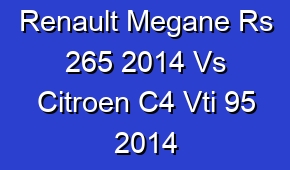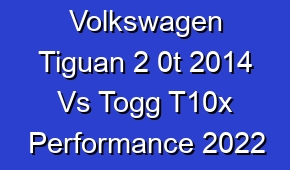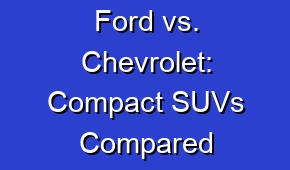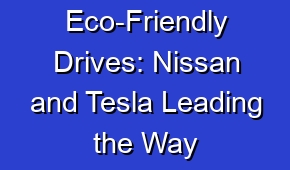Tesla vs. Nissan Leaf: Electric Titans Compared
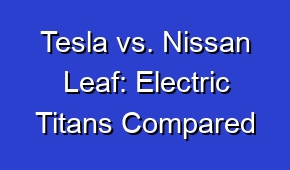
Get ready for an electrifying showdown between two automotive giants: Tesla and Nissan Leaf. In this article, we delve into the battle of the electric titans, comparing these innovative vehicles in terms of performance, range, and eco-friendliness. Discover which electric car comes out on top in this thrilling competition.
When it comes to the electric vehicle market, two titans stand out: Tesla and the Nissan Leaf. These two vehicles have been at the forefront of the industry, revolutionizing the way we think about transportation. With their cutting-edge technology and eco-friendly features, both Tesla and the Nissan Leaf have captured the attention of consumers worldwide.
One of the key factors that sets these electric titans apart is their range. The Tesla boasts an impressive range of up to 370 miles on a single charge, giving drivers the freedom to travel long distances without worrying about running out of power. On the other hand, the Nissan Leaf offers a range of around 150 miles, making it a great option for daily commuting and shorter trips.
In terms of performance, Tesla takes the lead with its lightning-fast acceleration and high top speeds. The Nissan Leaf, while not as powerful, still delivers a smooth and enjoyable driving experience. Both vehicles prioritize safety, with advanced features such as collision avoidance systems and adaptive cruise control.
When it comes to charging infrastructure, Tesla has a clear advantage. The company has built an extensive Supercharger network, allowing drivers to quickly recharge their vehicles at convenient locations across the country. While the Nissan Leaf also has a growing charging network, it is not as widespread as Tesla’s.
In conclusion, both Tesla and the Nissan Leaf are formidable contenders in the electric vehicle market. While Tesla offers superior range, performance, and charging infrastructure, the Nissan Leaf provides a more affordable option for those looking to make the switch to electric. Ultimately, the choice between these two electric titans depends on individual needs and preferences.
| Electric titans: Tesla vs. Nissan Leaf |
| The Tesla Model S has a longer range compared to the Nissan Leaf. |
| The Nissan Leaf is more affordable in terms of price compared to Tesla. |
| Tesla’s Supercharger network provides faster charging options for their electric vehicles. |
| The Nissan Leaf offers a more compact and practical design for urban driving. |
- The Tesla Model S is known for its high-performance capabilities and luxurious features.
- The Nissan Leaf is one of the best-selling electric vehicles globally.
- Tesla’s Autopilot feature enables semi-autonomous driving experience.
- The Nissan Leaf has a regenerative braking system that helps maximize energy efficiency.
- Tesla’s Model 3 offers a more affordable option for consumers interested in electric vehicles.
What are the key differences between Tesla and Nissan Leaf?
Tesla and Nissan Leaf are two popular electric car models, but they have some key differences. One of the major differences is in their range. Tesla cars generally have a longer range compared to Nissan Leaf, allowing for more miles on a single charge. Another difference is in terms of performance. Tesla cars are known for their acceleration and speed, often outperforming Nissan Leaf in this aspect.
| Range | Charging Time | Price |
| Tesla: Longer range, up to 400 miles on a single charge. | Tesla: Faster charging time, can charge up to 80% in 30 minutes with Superchargers. | Tesla: Higher price range, starting from $39,990 for Model 3. |
| Nissan Leaf: Smaller range, up to 226 miles on a single charge. | Nissan Leaf: Slower charging time, can take up to 7-8 hours for a full charge with a standard charger. | Nissan Leaf: Lower price range, starting from $31,670 for the base model. |
| Note: The specific details may vary depending on the model and specifications. | ||
Which electric car has better charging infrastructure, Tesla or Nissan Leaf?
When it comes to charging infrastructure, Tesla has an advantage over Nissan Leaf. Tesla has its own extensive Supercharger network, which allows for faster charging times and more convenient long-distance travel. On the other hand, Nissan Leaf relies on public charging stations, which may not be as widespread or as fast as Tesla’s Superchargers.
- Tesla Supercharger Network: Tesla has a vast and well-established Supercharger network, which allows Tesla owners to charge their vehicles quickly and conveniently. The Supercharger stations are strategically located along popular travel routes and offer high-speed charging, providing a significant advantage in terms of charging infrastructure.
- Nissan Leaf Charging Stations: While Nissan does not have a dedicated charging network like Tesla, Nissan Leaf owners can still access a wide range of charging options. The CHAdeMO fast-charging standard is supported by many public charging stations, allowing Nissan Leaf owners to charge their vehicles relatively quickly. Additionally, Nissan has partnered with various charging networks to expand the availability of charging stations for Leaf owners.
- Third-Party Charging Networks: Both Tesla and Nissan Leaf owners can also utilize third-party charging networks. These networks, such as ChargePoint and EVgo, offer a range of charging options for electric vehicle owners, including fast-charging stations. While Tesla owners can use these networks with an adapter, Nissan Leaf owners can directly access these charging stations without the need for additional equipment.
Are Tesla cars more expensive than Nissan Leaf?
In general, Tesla cars tend to be more expensive than Nissan Leaf. Tesla is positioned as a luxury electric car brand and offers high-end features and performance, which comes with a higher price tag. On the other hand, Nissan Leaf is more affordable and aimed at a broader market segment.
- Tesla cars generally have a higher starting price compared to Nissan Leaf.
- Tesla offers different models with varying price ranges, while Nissan Leaf has a more limited model lineup.
- Nissan Leaf is considered to be one of the more affordable electric cars on the market.
- Tesla cars often come with additional features and advanced technology, which can contribute to their higher cost.
- Both Tesla and Nissan Leaf may qualify for government incentives and tax credits, which can help offset the overall cost.
Which electric car has better technology, Tesla or Nissan Leaf?
When it comes to technology, Tesla is often considered to be at the forefront. Tesla cars come with advanced features such as Autopilot (semi-autonomous driving), over-the-air software updates, and a large touchscreen interface. While Nissan Leaf also incorporates some technology features, it may not be as advanced or comprehensive as Tesla’s offerings.
| Tesla | Nissan Leaf |
| Longer range | Shorter range |
| Faster acceleration | Slower acceleration |
| Supercharging network | Standard charging network |
What is the driving range of Tesla and Nissan Leaf?
The driving range of Tesla and Nissan Leaf can vary depending on the specific model and battery capacity. Tesla cars generally have a longer range, with some models capable of over 300 miles on a single charge. Nissan Leaf, on the other hand, typically offers a range between 150-226 miles, depending on the model.
The driving range of Tesla varies depending on the model, while Nissan Leaf has an average range of 150-226 miles.
Which electric car is more popular, Tesla or Nissan Leaf?
In terms of popularity, Tesla has gained significant attention and has a larger market share compared to Nissan Leaf. Tesla’s sleek designs, cutting-edge technology, and strong brand presence have contributed to its popularity among electric car enthusiasts and consumers.
Tesla is more popular than Nissan Leaf in the electric car market.
What are the available models of Tesla and Nissan Leaf?
Tesla offers several models in its lineup, including the Model S, Model 3, Model X, and Model Y. Each model has its own unique features and specifications. On the other hand, Nissan Leaf has different generations of the car, with the latest being the Nissan Leaf e+.
Tesla Models
– Tesla Model S
– Tesla Model 3
– Tesla Model X
– Tesla Model Y
Nissan Leaf Models
– Nissan Leaf S
– Nissan Leaf SV
– Nissan Leaf SL
– Nissan Leaf Plus
Comparison
– Tesla offers a wider range of models including sedans (Model S and Model 3), SUVs (Model X and Model Y), and a sports car (Roadster).
– Nissan Leaf is exclusively an electric hatchback available in different trims such as S, SV, SL, and Plus.
– Tesla models generally have longer range and faster acceleration compared to Nissan Leaf models.






